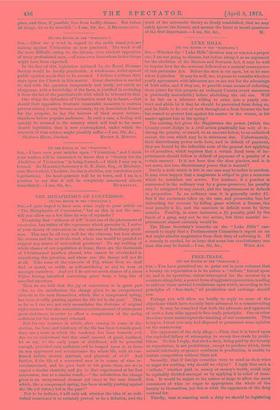THE METAPHYSICS OF CONVERSION._
[TO THE EDITOR OF THE "SPECTATOR:'] Sin,—I quite hoped to have seen some reply to your article on "The Metaphysics of Conversion," but as this is not the case, will you allow me a few lines by way of rejoinder?
Premising that "sickness of self " is not one of the phenomena of conversion, but rather of the repentance which precedes it, I arrive at your theory of conversion as the outcome of hereditary good- ness. This may be all very well for the virtuous, but how about the vicious and the ne'er-do-weel, where one would be puzzled to suggest any source of antecedent goodness? To say nothing of whole classes of our population at home, there are the thousands of Christianised heathen abroad, who cannot be overlooked in considering this question, and whose case the theory will not fit at all. Take some of the converts of Fiji, whose lives we shall find as moral, as noble, as self-sacrificing as any we hear of amongst ourselves. And yet I do not see much chance of a pious Fijian having inherited converting grace from a long line of cannibal ancestors.
Then we are told that the joy of conversion is in great part /due to the satisfaction the change gives to an overpowered element in the men themselves, which, like a compressed spring, has been steadily pushing against the life led in the past." This, as far as I can see, not only necessitates the doctrine of original righteousness, but also necessitates a certain amount of subsequent gross sinfulness, in order to effect a compression of the spring sufficient for the necessary rebound.
But for one instance in which, after coming to years of dis- cretion, the bent and tendency of the life has been towards good, there are a score in which the tendency has been towards evil. Are we to understand that this small amount of good, confined, let us say, to the early years of childhood, will be powerful enough, provided only sufficient evil be heaped upon it, to force its way uppermost and revolutionise the whole life, with its con- Srmed habits, mental, spiritual, and physical, of evil? And further, if the life of a converted man is in course of time re- revolutionised, and he goes back to his gross vices, are we to expect a similar elasticity and joy to that experienced at his first conversion, due to a similar result,—"the satisfaction the change gives to an overpowered element (of vice) in the man himself, which, like a compressed spring, has been steadily pushing against the life (of virtue) led in the past?"
Not to be tedious, I will only ask whether the idea of an indi- vidual conscience is so certainly proved to be a delusion, and the truth of the automatic theory so firmly established, that we may safely ignore the former, and assume the latter in moral questions.
of the first importance.—I am, Sir, &c., M.


































 Previous page
Previous page